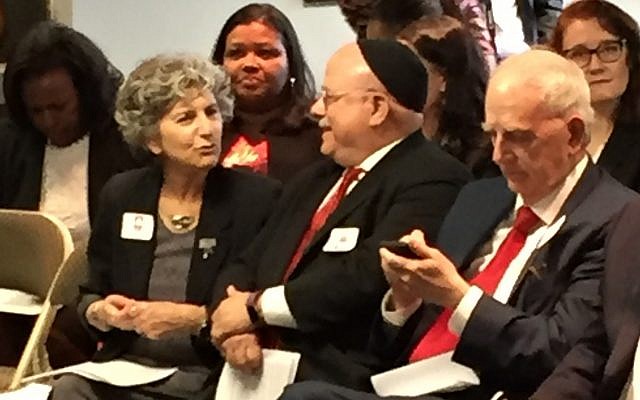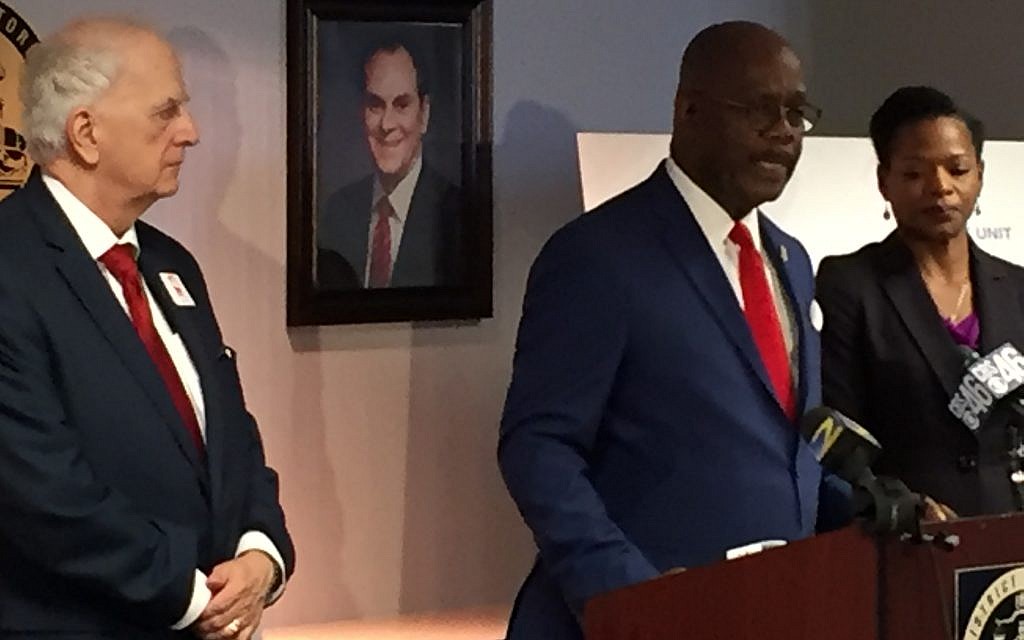Leo Frank Gets Second Look
“There is no statute of limitations on doing the right thing," as Rabbi Steve Lebow has shown as a leading voice in the effort to exonerate Leo Frank.
Dave Schechter is a veteran journalist whose career includes writing and producing reports from Israel and elsewhere in the Middle East.

Speaking to reporters at the Fulton County Courthouse, former Georgia Gov. Roy Barnes credited Rabbi Steve Lebow of Temple Kol Emeth with telling him, “There is no statute of limitations on doing the right thing.”
Throughout his 33 years at the Marietta synagogue, Lebow has been a leading voice in the effort to exonerate Leo Frank for his 1913 murder conviction. And in Barnes, he has an influential ally, who persuaded Fulton County District Attorney Paul L. Howard, Jr., to bring Frank’s case before a newly created Conviction Integrity Unit.
Barnes, who will be an adviser to the unit, stood to Howard’s right on May 7 as the district attorney explained that the Frank case fit the fourth of four criteria for re-examination – cases that are in the “interest of justice.”
Among the other cases to be studied is that of Wayne Williams, who was convicted in 1982 of killing two men and is serving life sentences in the state prison but was suspected by police in nearly two dozen of the 1979-81 “missing and murdered children” cases.
“The CIU will review cases in which there is new factual, physical, or forensic evidence. The unit will also review cases in which there is relevant evidence that went untested at the time of trial or some other new evidence that a person was wrongly convicted,” Howard said.
He also mentioned that his office has record of the 37 people who, according to the Equal Justice Initiative, were lynched in Fulton County between 1877 and 1950.

Frank, an Ivy League-educated Jew from New York, was convicted and sentenced to death for the April 26, 1913, strangling death of 13-year-old Mary Phagan at the downtown Atlanta factory of the National Pencil Company, where he was the director. Frank was found guilty in large measure based on testimony by Jim Conley, an African American janitor at the factory, who, according to a former factory employee who came forward in 1982, was seen carrying Phagan’s body.
Barnes recalled newspaper reports that as jurors walked to the courthouse from the Kimball House, where they were sequestered, a mob chanted “Hang the Jew or we’ll hang you.”
The Supreme Court of the United States rejected Frank’s appeals, but on June 21, 1915, Gov. John Slaton, who had developed doubts about Frank’s guilt, commuted the sentence to life in prison. On the night of Aug. 16, members of an enraged confederacy of Cobb County men, including the grandfather of Barnes’ wife, kidnapped Frank from the state prison in Milledgeville and drove him to the woods near Frey’s Gin Road in Marietta, where he was hung from a tree in the pre-dawn of Aug. 17.
The Georgia State Board of Pardons and Paroles posthumously pardoned Frank in 1986 but did not exonerate him. A monument to Frank, funded by Jerry Klinger, president of the Jewish American Society for Historic Preservation, now sits on Roswell Road near Interstate 75, the woods having been cleared and built on many years ago.
“There is no doubt in my mind, and we’ll prove it at the appropriate time, that Leo Frank was not guilty,” Barnes said. “We can’t right all wrongs. However, I think it’s a bad thing if we can never admit we’re wrong. This gives us a good view of history to make sure we’ve got it right.”
There is no timetable for the CIU’s re-examination of the Frank case, in large measure because a director for the unit has not yet been hired and funding from the county must be arranged.
Nonetheless, as he left the courthouse after the press conference, Lebow found reason for optimism.
“This is the most confident anybody could be in the last 100 years that the Frank case will be treated fairly. Justice delayed is justice denied and it’s been delayed for over 100 years for this guy,” Lebow said. “If you want to make the future good, you have to make the past right, and this is an opportunity to make the past right and to heal a bad part of Georgia’s history.”



comments